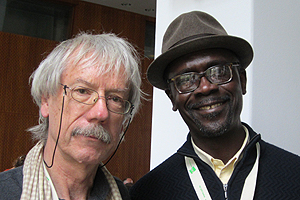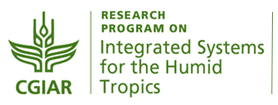
Global Issues: Rebuilding a systems capability?


At the 2014 IFSA Symposium in Berlin, two sessions were devoted to initiate a collaboration between CGIAR researchers (Patrick Dugan and Kwesi Atta-Krah were present) and the farming system community, represented by the European IFSA.
IFSA contact group for further discussions:
Bernard Hubert (Agropolis President, and INRA)
Cees Leeuwis (WUR, Professor of Knowledge, Technology and Innovation)
Ann Waters-Bayer (ETC Foundation / Prolinnova International)
Nadarajah Sriskandarajah (SLU, Professor in Environmental Communication)
The virtual community for integrated systems research in the humid tropics of Africa, Asia and Americas. Your active participation in posting polls, questions, answers, documents, etc., helps to build a first class community that acts as a reference point and resource for researchers, practitioners, students, investors and any other interested party.
The first Humidtropics Integrated Systems Conference, with the theme "The role of systems research in sustainable intensification" took place at IITA in Ibadan (Nigeria), 7-10 October 2014.
Background and rationale:
Currently, IFSA Europe has built strong recognition for its dynamics and capacity to capitalize on Farming Systems Research (FSR). Thus, at the 2014 Symposium, IFSA Europe has chosen to re-examine FSR in the context of global issues and widen its influence to a larger audience. This could lead to a greater involvement in advising European decision makers about the future of agriculture and to help them take a broader view on the diversity of farming practices and what it means to those on the rest of this planet.
At the same time, the Consultative Group on International Agricultural Research (CGIAR) is involved in an important reform since 2010 which aims to lead its 15 International Research Centers located all over the world to work together through cross-cutting-programmes called the CRP (CGIAR Research Programmes). These are focused on major issues and are built in partnership with other research bodies from the North and the South.
Three of these CRPs explicitly refer to a systems approach (Aquatic Agricultural Systems, Humidtropics, and Dryland Systems). For many CGIAR researchers, this means taking a new approach, as so far they were mainly involved in specialized approaches according to the major commodities (rice, wheat, maize, barley, sorghum, millet, bananas, cassava, meat, milk, etc).
Considering this recent development within the CGIAR institutes (and building on the strong Farming Systems Research initiatives that were supported by CYMMIT and IRRI in the 1980s) it is important to develop research skills to take into account the whole farming system, the relations between crops and livestock, the gender relations within the labour cast, the share between self consumption and commercialization, the role in territorial dynamics, etc.
The Global Forum at the IFSA 2014 was structured around two sessions:
Forum I: setting the scene
- Patrick Dugan (Director of the CRP Agricultural Aquatic Systems and Scientific director of WorldFish): Farming systems approach in the CGIAR reform: a way to achieve "Intermediary Development Outcomes". In his presentation, Patrick Dugan traced the process of the CGIAR reform, and how it has ended up with the 15+1 CRPs, giving emphasis to the particular issue of the Systems CRPs, as well as increasing systems thinking within the broader CGIAR. The new and expanded environment of 'systems approaches' was also highlighted as part of the new developments in CGIAR research.
- Richard Bawden (Prof. Emeritus at the University of Western Sydney): Opportunities for systemic transformations: 50 years of reflections. In his presentation, Richard Bawden noted that there was resurgence of systems thinking and a renewed recognition of the importance of systems research approaches. Yet, he expressed his fear that there might be more people talking about systems research than really doing Systems Research. He also indicated that 'systematic' aspects appear to be receiving more emphasis in research, rather than the more important 'systemic' dimensions in systems research.
Forum II: short presentations of and discussing research issues:
- Ray Ison (Open University, UK & Monash University, Melbourne): Systems thinking: a diversity of approaches and epistemologies
- N. Sriskandarajah (SLU, Uppsala): Systems research and practitioners' engagement
- Hatem Belhouchette (CIHEAM and INRA-UMR System, Montpellier): Modeling for learning and action
Conclusions of the IFSA Global Forum 2014
The outcome of the Global Issues session was presented at the Closing Plenary by Bernard Hubert (Agropolis International) and complemented by Kwesi Atta-Krah (CGIAR). The following were the key conclusions:
- Establish an informal contact group between IFSA-Europe and the CGIAR S-CRP communities to enhance collaboration and knowledge exchange (see top of page)
- Members of the IFSA are invited to participate in the Systems Research Conferencebeing organized at IITA Ibadan, 7-10 October 2014, by Humidtropics in partnership with Drylands and AAS
- Design an agenda for PhD training courses and Capacity building seminars. These courses and seminars should clarify what a 'systemic' approach means and how it can be implemented in farming systems research, beyond mere 'systematic' and 'participatory' approaches.
